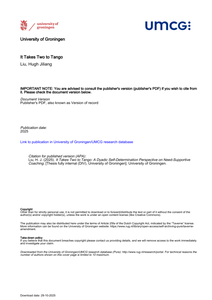Acknowledging the knowledge gaps and novel paradigms outlined above within both coaching research and practice, the PhD research aims to investigate how need-supportive coaching—rooted in Self-Determination Theory (SDT)—effectively fulfils the satisfaction of beginning teachers’ basic psychological needs (BPNs) and autonomous motivation in pursuing their coaching goals within dyadic coaching relationships. To systematically explore this overarching objective, this PhD project and thesis adopt a structured, four-step approach, where each step investigates specific and complementary aspects of the coaching process. Collectively, these steps provide a comprehensive examination of how and under what conditions BPN-supportive coaching facilitates optimal motivational outcomes, enriching our understanding of the dynamic processes that shape coaching effectiveness among beginning teachers. Specifically, four research questions systematically guide the four research steps:1. What is the current state of empirical evidence linking BPN support, BPN satisfaction, and autonomous motivation within coach-coachee relationships?2. How do perceptual distances between coaches’ and coachees’ perceptions regarding BPN support relate to the coachees’ BPN satisfaction?3. How do coaches’ and coachees’ BPN satisfaction mutually predict autonomous motivation toward shared goals in their dyadic relationships?4. How do coaches and coachees dynamically co-regulate BPN interactions in real-time dyadic coaching conversations?Chapter 1 outlined a four-step empirical approach across Chapters 2 to 5 to understand BPN-supportive coaching. Chapter 2 meta-analysed the extant literature guided by a circular framework connecting BPN support, BPN satisfaction, and autonomous motivation for both parties. The results revealed that previous studies predominantly used individual-level data, neglecting the dynamic, reciprocal interactions in coaching. Chapter 3 investigated perceptual distance between coaches and coachees regarding BPN support using polynomial regression and response surface analysis. Results indicated that coachees reported greater BPN satisfaction when perceptions were closely aligned. Chapter 4 adopted the Actor-Partner Interdependence Model to examine how both parties’ BPN satisfaction is associated with their own and each other’s autonomous motivation. We found a positive unidirectional association between coachees’ relatedness satisfaction and coaches’ autonomous motivation and bidirectional associations for autonomy satisfaction. Chapter 5 employed State Space Grid analyses to capture the moment-to-moment co-regulation of autonomy in coach-coachee dyads. Results revealed recurrent patterns of predominant functional co-regulation (e.g., autonomy support met with proactive autonomy expression), and occasional dysfunctional co-regulation (e.g., evaluative feedback met with disengagement). Temporal evolvement in autonomy co-regulation was identified across coaching sessions in response to changing goals. Chapter 6 synthesised the contributions of the thesis. Collectively, BPN-supportive coaching can be viewed as a context-sensitive, interdependent, co-regulatory, and dynamic process, and we provided guidance for adaptive and relationally grounded coaching practices.
DOCUMENT

In Nederland worden ongeveer 1,9 miljoen honden gehouden als gezelschapsdier, daarnaast worden ze in toenemende mate ingezet in dierondersteunde interventies. Alhoewel de effectiviteit van de inzet van dieren bij deze interventies vanuit wetenschappelijke studies beperkt is wordt de toegevoegde waarde van dieren door therapeuten, coaches en cliënten onderstreept. De inzet van honden bij Animal Assisted Interventions (AAI) is een dyadische gebeurtenis waarbij de belangen van zowel het dier als de cliënt continu in ogenschouw genomen moeten worden. Een gebrek aan een wetenschappelijk onderbouwd kader voor AAI kan leiden tot praktische, ethische en veiligheidsrisico’s voor therapeuten, begeleiders en cliënten. Gesprekken met aanbieders van interventies beamen de sterke groei en laten zien dat er in de branche een beweging en verlangen bestaat tot professionalisering en samenwerking. Iedere organisatie houdt zijn eigen, deels op ervaring berustende, richtlijnen aan op gebied van welzijn en ethiek. Er is behoefte aan een transparante en goed onderbouwde werkwijze waarmee het welzijn van honden in de praktijk van dierondersteunde interventies gewaarborgd kan worden. Het doel van dit project is om een bijdrage te leveren aan het professionaliseren van het werkveld door inzicht te geven in de impact die dierondersteunde interventies op honden kunnen hebben, welke waarden en normen we daarvoor willen hanteren en hoe ethische vraagstukken bespreekbaar gemaakt kunnen worden. Om dit te bewerkstelligen wordt er een methode ontwikkeld om de belasting van de honden tijdens een sessie te monitoren, inclusief digitaal scoringsformulier. De huidige belasting in de praktijk wordt in kaart gebracht en er worden met behulp van professionals grenswaarden voor de mate van belasting bepaald. Om tot een ethisch afwegingskader te komen worden praktijkcasussen, waarbij het belang van de zorgbehoevende mens conflicteert met het welzijn van de hond, geanalyseerd. Dit proces staat onder begeleiding van deskundigen op het gebied van dierethiek.